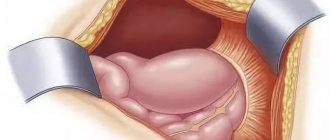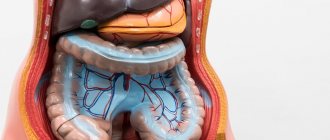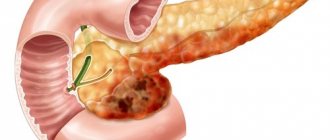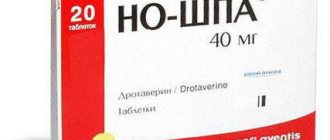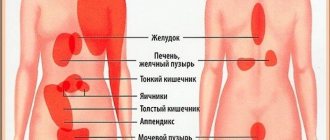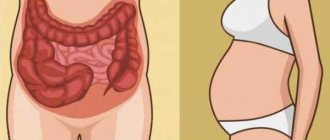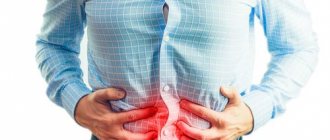Etiology
The main causes of heaviness in the left hypochondrium include:
- pathology of the left kidney;
- spleen diseases;
- pathological processes of the small and large intestines;
- diseases of the liver and pancreas;
- abdominal organ injuries;
- hernia.
Secondary etiological processes include:
- pneumonia of the left lung;
- cardiovascular diseases, in particular coronary heart disease, heart attack, angina pectoris;
- lumbar osteochondrosis;
- inflammatory diseases in the appendages on the left side;
- consequences of the operation;
- excessive physical activity.
In addition, a feeling of heaviness in the left hypochondrium can be observed after overeating or eating heavy, fatty foods.
In any case, if this symptom is observed frequently and is accompanied by additional signs of the clinical picture, you should consult a doctor.
Organs in the left hypochondrium
The left hypochondrium is the area located below the two lower ribs to the left of the center of the abdominal cavity.
The following bodies are located in this area:
- spleen;
- the left side of the diaphragm (the diaphragm is a muscle located in the upper abdominal cavity and separates it from the sternum);
- colon;
- small intestine;
- left side of the stomach;
- pancreas;
- left kidney and ureter.
If you feel discomfort in the left hypochondrium, it is likely that one of these organs is not working properly. However, heaviness can also be caused by pathologies of internal organs on the other side of the abdomen or parts of the body.
Symptoms
Heaviness in the left hypochondrium in front is most often caused by diseases of the gastrointestinal tract. The clinical picture in this case may manifest itself as follows:
- a feeling of heaviness, which is often accompanied by aching, dull pain. As the pathological process worsens, the pain may become more intense and frequent;
- nausea, which may be accompanied by vomiting;
- changes in stool frequency and consistency;
- flatulence, rumbling in the stomach;
- worsening appetite and weight loss due to this;
- heartburn, belching with an unpleasant odor;
- feces may contain undigested food particles and blood;
- weakness, increased fatigue;
- increased sweating, which may worsen at night.
In case of kidney pathologies, this symptom may be accompanied by the following specific signs:
- pain in the left hypochondrium, which can radiate to the lower back;
- change in the color of urine, often mixed with blood;
- frequent urination, especially at night, which may be accompanied by pain;
- nausea, vomiting;
- swelling of the face and legs;
- high blood pressure;
- pallor of the skin.
If heaviness in the left hypochondrium is a sign of pathologies in the spleen area, then the following symptoms may be present:
- a person often gets sick, there is an exacerbation of chronic diseases, which is due to a weakened immune system;
- substernal pain that radiates to the back;
- increased susceptibility to mechanical stress - formation of hematomas even with minimal impact;
- enlarged spleen;
- low-grade fever.
A feeling of heaviness in the left hypochondrium may be due to pathological processes in the liver, as evidenced by the presence of the following symptoms:
- yellowness of the skin, sclera (a specific sign of hepatitis of any nature);
- nausea, vomiting with bile;
- dyspeptic disorders;
- weakness, fatigue even with minimal physical activity;
- irritability, sudden mood swings;
- spider veins, itching all over the body;
- liver palms.
In addition, heaviness in the left hypochondrium, which is accompanied by pain, may indicate cardiovascular disease. In such cases, symptoms may manifest as the following:
- attacks of acute, cramping pain;
- high blood pressure;
- rapid pulse;
- pain in the chest, possibly of a compressive nature.
If such a clinical picture is present, you should urgently seek medical help, as there is a high risk of developing complications that threaten human life.
In any case, a feeling of heaviness and other third-party signs in the left hypochondrium is a good reason for a medical examination. Ignoring this symptom or self-medication can lead to serious complications, including death.
Causes
Heaviness in the left hypochondrium after physical activity
If such discomfort occurs only during strenuous physical exercise, such as running, walking, jumping, it does not pose a danger, since it happens to almost every person, even if he is completely healthy. These sensations usually pass quickly and are only a sign that the person has not warmed up before physical exercise. Without a good “warm-up” of the body, it may not have time to adapt to the stress.
Before training, you need to do a warm-up - this will help avoid pain.
Important! Even if a person is absolutely healthy, there is no point in testing your body - you need to stop, relax your arms and shoulders, take a deep breath and, as you exhale, press your palm on the area where you feel heaviness. In this case, you need to sharply tilt your body forward. It is enough to repeat this manipulation 2-3 times, after which you can continue training.
It is also necessary to control your breathing: during exercise it should be deep, since shallow and frequent breathing is accompanied by disturbances in the functioning of the diaphragm. It is important that training should be carried out at least an hour after the last meal.
But if there is a sudden sharp pain on the left side under the ribs, not associated with physical activity, this is a reason to seek medical help. Such a symptom may indicate a malfunction of the kidneys, spleen, perforation of the small intestine or stomach.
If pain in this area occurs after a fall, injury, or accident, it may be a sign of serious internal organ damage that is life-threatening.
Diaphragmatic hernia
Constant heaviness in the left hypochondrium can occur with a diaphragmatic hernia. The diaphragm, required by the esophagus, which connects to the stomach, separates the chest cavity from the abdominal cavity. As the muscle tissue weakens, the “gap” between them widens and the stomach can shift. In this case, the contents of the stomach are thrown into the esophagus, causing continuous dull, aching pain in the left hypochondrium, with nausea and heartburn.
Heaviness in the left hypochondrium may occur due to a diaphragmatic hernia
Intercostal neuralgia
Neurological diseases can cause compression or inflammation of nerve endings. Discomfort with intercostal neuralgia can manifest itself in different ways:
- in the area of the ribs and heart - shooting, stabbing, burning or dull pain;
- heaviness increases with sneezing, sudden movements, coughing, and even when turning the body;
- attacks of intercostal neuralgia are accompanied by heaviness in the chest on the left side, pallor or redness of the skin;
- upon palpation the pain intensifies.
Intercostal neuralgia is one of the reasons for such discomfort
With neuralgia, pain can be localized not only in the left hypochondrium, but also under the shoulder blades (as in the case of heart disease). Most often, discomfort is felt at night and in the morning, sometimes a tingling sensation occurs.
Cardiovascular diseases
Heaviness in the left hypochondrium in combination with shortness of breath during exercise and even rest, nausea, palpitations, burning in the chest are associated with heart disease. When the coronary arteries are damaged, the blood supply to the heart muscle is disrupted, leading to pathological conditions such as ischemia.
With cardiomyopathy and ischemia, pain is felt not only in the heart, but also in the left hypochondrium
In addition, pain below the ribs can occur with cardiomyopathy - a number of different diseases that lead to dysfunction of the heart muscle. This manifests itself in fatigue, pain on the left side during physical activity.
Pathological conditions of the spleen
The spleen is a fragile organ, so any pathological condition manifests itself in the form of severe discomfort. A slight enlargement of the organ is difficult to recognize, especially in overweight people, because it is located deep in the left hypochondrium. An enlarged spleen, or splenomegaly, is observed in some infectious diseases, for example, infectious mononucleosis. However, in addition to pain in the spleen, this disease has symptoms such as fever, muscle pain, migraine, lymphadenopathy, sore throat, and liver enlargement. The spleen performs several important functions in the body:
- This is the best blood filter;
- it is the largest lymph node;
- it is the largest conglomerate of reticuloendothelial tissue.
An enlarged spleen causes severe discomfort
Other causes of pain and enlargement of the spleen include injury, tumors, or developmental defects. Particularly sharp acute pain in this area occurs when a blow or injury causes a rupture of the spleen. In addition to pain, a sign of rupture is cyanosis of the skin around the navel as large amounts of blood accumulate.
Gastrointestinal diseases
Diffuse, dull pain and heaviness under the ribs on the left, appearing periodically over a long period of time, may be a sign of a chronic disease of the gastrointestinal tract. The most common are cholecystitis, gastritis, pancreatitis and others. To confirm or exclude these pathologies, you should contact a gastroenterologist and conduct a series of laboratory tests and instrumental studies.
Gastritis
This disease affects a large part of the population, since the current state of the food industry, aimed at including chemicals in products, contributes to the development of functional disorders of the stomach and the entire gastrointestinal tract. The gastric mucosa is quite sensitive to such triggers, which are more than enough in our regular diet. Gastritis most often manifests itself in the form of pain in the hypochondrium, nausea, pain in the epigastric region, vomiting, heartburn, and bloating. These symptoms appear soon after eating. General disorders may also occur - pallor, dry mouth, burning sensation in the lower and upper extremities, signs of dyspepsia - diarrhea, constipation.
Ulcer
Stomach ulcers and duodenal ulcers are chronic diseases that usually occur as a result of eating disorders, stress, smoking and alcohol abuse. Hereditary predisposition also plays an important role. The main symptoms of ulcers are, as a rule, pain in the pancreas, stomach and duodenum, heaviness in the left hypochondrium. Other prominent symptoms are sharp, sudden pain, loss of consciousness, pallor, general weakness and loss of appetite.
Ulcers of the stomach and duodenum cause severe pain and heaviness in the left hypochondrium
Pancreatitis
The most characteristic symptom of acute pancreatitis is heaviness and severe pain in the left hypochondrium, in the epigastric region, accompanied by vomiting of bile, nausea, bitterness in the mouth, fever; urine may be dark in color. The discomfort can be so strong that a person has to take unnatural positions, he may lose consciousness or even die from painful shock. With chronic pancreatitis, patients complain of aching pain, especially after eating.
With oncological lesions of the pancreas, it is very difficult to establish a diagnosis, since it is a very small, hard-to-reach organ that is difficult to examine and treat, and the symptoms of cancer are almost invisible at the onset of the disease.
Oncological diseases of the digestive tract
Symptoms of such diseases: weakness, lack of appetite, anemia, refusal of usual food, such as meat, periodic pain in the stomach, intestines, constipation and diarrhea. Oncology is dangerous because in the early stages the symptoms may not appear too strongly, and people often do not consult a doctor in a timely manner. Therefore, if you feel heaviness in the left hypochondrium for a long time (1-2 weeks), you need to consult a doctor to find out the cause and promptly carry out therapy.
Heaviness in the left hypochondrium after eating
The most common causes of pain in this area after eating can be:
- eating fast food. People often complain of such discomfort after eating. This is because when cooking fried potatoes or french fries, the oil is changed very rarely. When the oil is used for the third or fourth time, it becomes poisonous and releases carcinogens. This can be seen even with the naked eye when looking at the deep fryers in such cafes. The oil begins to change color to yellow and brown or even black. For this reason, lovers of food “on the go” most often suffer from ulcers, and some even face stomach cancer;
Eating fast food can lead not only to temporary pain and heaviness in the hypochondrium, but also to diseases of the gastrointestinal tract
- alcohol abuse during meals. In moderate doses, alcohol can stimulate the gastrointestinal tract, but the dose should not exceed fifty grams of vodka, brandy or one hundred grams of wine. In large doses, alcohol not only clouds the mind, but also quickly destroys healthy cells and irritates the pancreas;
- binge eating. A strong love for food can lead not only to excess weight, but also to the appearance of heaviness in the left hypochondrium. When overeating, the walls of the stomach become greatly stretched, and this causes discomfort. You need to control the amount of food: this will help not only get rid of the unpleasant feeling in the stomach, but also protect yourself from obesity.
It is important to control the amount of food consumed
- injury. A bruise, blow, fall or careless movement can cause long-term pain after each meal. Due to the powerful impact of physical force, hematomas, microcracks and fissures can form on the internal organs, which disrupts their normal functioning.
Determining the cause by localization of sensations
By where exactly the pain and heaviness is felt, you can determine the exact cause of the discomfort.
If it is felt under the ribs in the front, this indicates pathologies of the spleen or stomach, myocardial infarction, myositis. If the discomfort is felt more in the center, it is likely that several diseases are developing in the body at once: as a rule, these are diseases of the stomach, gallbladder and duodenum.
Most often, with damage to the left kidney and thoracic and lumbar osteochondrosis, heaviness is felt in the left hypochondrium behind, in the back.
Based on the localization of sensations, you can determine what caused the discomfort.
If heaviness extends from the back to the anterior abdominal wall, this may be a sign of inflammation of the pancreas - pancreatitis. During attacks of pancreatitis, a symptom of inflammation is also unbearable burning pain, which is relieved when a person bends forward in a sitting position.
Diagnostics
In general, diagnostic measures may include the following:
- general and biochemical blood test;
- stool occult blood test;
- general urine analysis;
- CT;
- MRI;
- Ultrasound of the abdominal cavity and genitourinary system;
- electrocardiography;
- excretory urography with a contrast agent for suspected kidney pathology;
- endoscopy;
- sigmoidoscopy.
The exact diagnostic program will depend on the current clinical picture and the collected medical history. If the patient took any medications to eliminate a symptom, the doctor must be notified.
Diagnosis of the pathogenesis of discomfort
Palpation - as an examination option
To diagnose the exact cause of pain and heaviness in the left hypochondrium, you should contact a general therapist, who, after analyzing the patient’s symptoms, will refer him to one of the specialized specialists.
The patient himself can determine which doctor should be contacted first. To achieve this goal, it is enough for him to assess the nature of the existing discomfort under the left rib.
Thus, different types of discomfort indicate corresponding damage to the body. Most often the nature of the pain is as follows:
- stable pain with a feeling of heaviness, fullness and nausea – damage to the gastrointestinal tract, you should contact a gastroenterologist;
- discomfort of a pulsating nature, which intensifies during coughing or even breathing - pathology of the respiratory system, lungs, you need to contact a general practitioner, surgeon or otolaryngologist;
- aching and dull pain – diseases of the spleen or kidneys, you will have to contact an endocrinologist;
- discomfort that increases with exhalation - neuralgia or osteochondrosis of the sternum, you should contact a surgeon or neurologist;
- burning pain, periodically radiating to the left arm or upper back - diseases of the cardiovascular system, a direct path to a cardiologist.
Regardless of the severity of the manifestations of a particular illness, the diagnosis of the problem with pain in the left hypochondrium is always complex. The typical procedure for its implementation is to implement 3 stages. To be more precise, we are talking about:
- About taking an anamnesis, which consists of a conversation between the doctor and the patient, analysis of the patient’s symptoms and study of his medical history.
- On conducting research on biomaterial necessary to determine the general condition of the body and the degree of its damage from the existing disease. Usually they take for analysis:
- blood;
- urine;
- cal.
For specific purposes, scrapings from various mucous membranes of the body can also be used. For example, if gastrointestinal damage is suspected, a smear is taken from the intestines, and if there is potential damage to the lungs, a smear is taken from the nasopharynx.
On the organization of instrumental examination techniques. Here the list of possible diagnostics is very wide and the final choice regarding the need for a particular technique is made exclusively by the treating specialist. The most frequently performed examinations are:
- X-ray;
- CT;
- MRI;
- Ultrasound.
Naturally, the subject of research is the anterior part of the left hypochondrium, where discomfort manifests itself. Based on the results of a comprehensive diagnosis, each patient is given an individual course of therapy, the severity of which depends on the severity of the identified pathology.
In some cases, it is possible to manage by taking certain medications, and sometimes surgical intervention is necessary, but more on that later.
Prevention
There are no targeted methods for preventing heaviness in the left hypochondrium; in general, you should adhere to the rules of a healthy diet, promptly eliminate all ailments and systematically undergo a preventive medical examination.
Diseases of the digestive tract are almost always accompanied by abdominal pain. The appearance of a strong feeling of fullness in the left hypochondrium is usually associated with pathologies of the gastrointestinal tract, kidneys, spleen and other organs. Therefore, pain in this part of the body cannot be ignored.
Main causes of discomfort
Unpleasant sensations in this part of the body signal the development of various diseases that require specific treatment.
Acute and chronic pancreatitis
A common cause of discomfort in the front of the left hypochondrium (without or with pain) is inflammation of the pancreas tissue. This organ produces important hormones and digestive enzymes. If the pain is predominantly localized on the left, this indicates the localization of the pathology in the caudal part of the organ.
Chronic pancreatitis is characterized by the production of insufficient amounts of digestive enzymes. In the presence of this disease, an unpleasant feeling of heaviness in the left hypochondrium and frequent loose stools occur after violating the prescribed diet. Half an hour after a meal, a person complains of discomfort in the abdominal area, nausea and vomiting.
Acute pancreatitis is accompanied by severe pain that has a girdling character. They are mostly localized in the front of the abdomen, but can radiate to the back and shoulder blades. The patient's condition worsens due to incessant vomiting, which does not bring relief. To get rid of suffering, a person lies on his side and pulls his legs to his chest.
Gastritis and stomach ulcers
These diseases are often accompanied by unpleasant sensations in the epigastrium, but quite often the pain can radiate to the left hypochondrium. The main symptom of gastritis is the occurrence of heaviness after eating fatty foods. The reason for this is the inability of the stomach to cope with large amounts of food in the presence of inflammation. Additional symptoms of gastritis include a feeling of fullness in the abdomen, bloating, and nausea.
With an ulcer, the pain becomes more pronounced. They occur on an empty stomach and disappear after eating. A person often suffers from nausea, vomiting, and sour belching. Due to disruption of the process of food digestion, body weight decreases significantly.
Kidney pathologies
Discomfort in the side occurs in the presence of urolithiasis or pyelonephritis. With the development of these pathologies, acute pain appears, which radiates to the back, abdomen, shoulder blades, perineum and other parts of the body. To alleviate his condition, the patient takes a forced position.
Video: pain in left side when running
Want to know why you get rib pain when running? Watch a video by a professional athlete and coach, which talks about the traditional point of view on this problem and the author’s vision of it, based on personal experience. How is this related to the general physical condition of a person, the load on the breathing apparatus, and the work of the diaphragm. You will learn what you should do so that when you walk fast, run, and do other dynamic loads, you are not bothered by unpleasant sensations in your left side.
The anterior part of the left hypochondrium is rich in internal parts of the body, so discomfort in this area is usually caused by damage to one of them.
It is undesirable to leave pain under the left rib unattended, since they are often the first sign of the development of a pathological condition. So, very often pain and heaviness in this area are the result of ailments of the nervous, respiratory and digestive systems.
In today’s material we will cover in more detail why it hurts under the left rib in the front, how dangerous it is and whether it can be treated. Interesting? Then be sure to read the article below to the end. We assure you that every reader will find a lot of useful information.
Alarming symptoms
Pain in the left hypochondrium is often a consequence of overeating, which does not require urgent medical attention. But if these symptoms appear, you must consult a doctor:
- acute abdominal pain that disrupts life;
- the appearance of signs of renal colic;
- persistent vomiting or diarrhea;
- loss of consciousness;
- significant increase in body temperature.
An ambulance must be called when the patient detects blood in the vomit or stool. This indicates the development of conditions that threaten his life.
Heaviness in the left hypochondrium during pregnancy
In order not to harm the baby, a pregnant woman should consult a doctor if the slightest discomfort occurs. Most often, the cause of such sensations is the heavy load on the body while carrying a baby, but they can also be caused by various pathologies.
During pregnancy, the uterus enlarges every week, and this can cause compression of the small and large intestines, stomach, pancreas and blood vessels, which can cause pain. In this case, the function of these organs may be impaired, resulting in poor circulation.
Heaviness and pain are usually mild and occur occasionally. In this case, the woman’s general condition does not worsen and no other symptoms are observed. This indicates that the pain is due to temporary physiological changes and is not something to worry about. Typically, such discomfort occurs in the third trimester of pregnancy and goes away after childbirth.
During pregnancy, women often experience mild pain in the left hypochondrium
However, if heaviness and pain in the left hypochondrium appear in the early stages of pregnancy, this may be a symptom of serious pathologies:
- reflux disease. The enlarged uterus puts a lot of pressure on the stomach, causing gastric juice to enter the esophagus, which is not intended for such an acidic substance. He gets irritated, and this causes severe pain in the left hypochondrium. Treatment may require the use of special drugs that eliminate the irritating effects of acid;
- chronic stomach diseases, such as gastritis and ulcers, have the ability to be activated at this time due to a decrease in immune defense;
- severity may be caused by exacerbation of chronic pancreatitis. The pathogenesis of the symptoms of the disease is determined by the release of pancreatic enzymes and their effect on the intestines and stomach - this poses a serious threat to the normal functioning of the gastrointestinal tract, as well as other nearby organs. Circulatory disorders are associated with the effect of toxins on blood vessels, which threatens the dysfunction of all organs;
Pain and heaviness may be caused by exacerbation of chronic pancreatitis
- disturbance of peristalsis and normal intestinal activity can also be manifested by pain in the abdomen on the left;
- During pregnancy, the kidneys and ureters become enlarged and this can cause pain. Therefore, it is necessary to exclude renal colic during the examination.
Heaviness in the left hypochondrium in 25% of pregnant women occurs due to changes in the body; in 65% of cases - due to exacerbation of chronic diseases. This emphasizes the need for careful diagnosis when planning pregnancy. Such problems occur in 90% of women in the third trimester, which is also associated with changes in the functioning of internal organs.
In 65% of cases, heaviness in the left hypochondrium during pregnancy occurs due to exacerbation of chronic diseases
Pain caused by compression of organs due to normal growth of the uterus does not cause severe irritation and does not require the use of analgesics. These sensations are unstable, are not accompanied by headache or dizziness, and do not cause any other symptoms. If the condition does not worsen, there is no need to see a doctor immediately - you just need to inform him about your condition at your next routine examination.
If pathologies develop during pregnancy, heaviness in the left hypochondrium is usually accompanied by weakness, loss of appetite, nausea and vomiting, heartburn, etc.
Diagnostics
If pain of any localization occurs, you should contact a therapist, who, if necessary, will write a referral to another specialized specialist. This could be a surgeon, gastroenterologist, cardiologist, neurologist, urologist, infectious disease specialist, or for women, a gynecologist. Diagnosis of pathological conditions usually includes the following studies:
- general and biochemical blood test;
- stool examination;
- Analysis of urine;
- Ultrasound of internal organs;
- MRI, CT.
The doctor may prescribe a cardiogram, x-ray and other additional studies, taking into account the developing clinical picture.
Therapy methods
If pain occurs due to disturbances in the gastrointestinal tract, it is necessary to follow a special diet. It is important to avoid heavy foods and alcohol. Meals should be small and varied. Only a doctor can give other recommendations regarding the composition of the diet, taking into account the characteristics of the development of a particular disease.
Antispasmodics are used to eliminate pain. When heaviness in the side is caused by an insufficient amount of digestive enzymes, drugs such as Creon and Mezim are prescribed. With the development of intestinal infections, the use of Nifuroxazide (an antimicrobial drug) is allowed.
To normalize intestinal function during diarrhea, the use of Smecta is recommended. It has an enveloping effect and removes toxins from the body. To restore the intestinal microflora, probiotics are prescribed (Linex, Hilak-Forte). They speed up the onset of recovery and restore reduced immunity after an illness.
Ivanova Svetlana
General practitioner of the second category, transfusiologist, 29 years of experience
Diagnosis and treatment of problems with the musculoskeletal system (lower leg) and abdomen.
- pain and discomfort in the abdomen;
- bruises and injuries of the lower leg;
- cough, chest pain;
- acute respiratory infections, ARVI;
- food poisoning;
- cold;
- runny nose;
- general malaise;
- headache;
- aching joints;
- elevated temperature.
- Diploma in the specialty “General Medicine (Treatment and Prevention)”, Chuvash State University named after. I.N. Ulyanova, Faculty of Medicine (1990)
- Internship in the specialty “Selected Issues of Therapy”, Kazan State Medical Academy (1996)
Refresher courses
- “Nephrology issues for therapists”, State Institute for Advanced Training of Physicians named after V.I. Lenin (1995)
- “Therapy”, Kazan State Medical Academy (2001)
- “Transfusiology”, Russian Medical Academy of Postgraduate Education of the Ministry of Health of the Russian Federation (2003)
- “Therapy and Pulmonology”, St. Petersburg Medical Academy of Postgraduate Education of the Federal Agency for Health and Social Development (2006)
- “Transfusiology”, St. Petersburg Medical Academy of Postgraduate Education of the Federal Agency for Health and Social Development (2007)
- “Transfusiology”, Institute for Advanced Medical Studies of the Ministry of Health and Social Development of Chuvashia (2012)
- “Therapy”, Institute for Advanced Medical Studies of the Ministry of Health and Social Development of Chuvashia (2013)
- “Therapy”, Peoples' Friendship University of Russia (2017)
Place of work: MedCenterService clinic on Kurskaya
On the left side of the body, under the rib, there is part of the diaphragm, the left part of the stomach, the ureter and one kidney, as well as the spleen. And if heaviness is felt on the left under the rib, this only indicates that some of these organs are affected and require treatment. Typically, pain manifests itself as a dull, constant sensation that may indicate the presence of a chronic disease. There may also be severe, acute pain that intensifies after eating. They indicate that organs affecting digestion are affected.
Everything in the human body is balanced. And if discomfort occurs, it’s for a reason. Pain and heaviness on the left side sends important signals to the brain that there are malfunctions in specific organs that require attention and treatment. You need to respond to pain correctly and not try to calm it down with conventional means, which only temporarily act on the symptom without solving the underlying problem. Self-medication is generally not recommended by anyone, so it is better to refrain from taking any medications and see a doctor as soon as possible.
Heaviness in the left hypochondrium in front
Glomerulonephritis
Glomerulonephritis affects the condition of the kidneys, leading to kidney failure. There are two types: diffuse and acute. Diffuse is a disease that is caused by weak immunity. The vessels of the internal organs are affected, as a result of which the kidneys begin to receive less blood and oxygen, their work deteriorates, and their functions decrease. It is considered the most common disease that affects the kidneys. The acute type of the disease is usually provoked not so much by immune diseases as by allergies. Usually the capillaries of two kidneys are affected at once. Usually males are affected, starting in adolescence. The disease is common in countries where there is a particularly cold, damp climate and develops in the off-season.
Pancreatitis
Pancreatitis is known in medicine as an inflammatory process of the pancreas. The enzymes of the organ stop forming and being released into the intestines, which should be the case for normal digestion. They stagnate inside the gland and gradually destroy it from the inside. Typically, pancreatitis is characteristic of those who drink alcohol in excessive quantities. Also, people with congenital or acquired gallbladder pathologies are at risk, especially if stones have already formed there.
Often, the condition of the pancreas can be affected by unsuccessful operations, as well as simply surgical interventions for a stomach ulcer or an incurable condition of the gallbladder. Problems may arise after an accident or fight if the abdomen was injured. Hormonal drugs, as well as strong antibiotics, the presence of infections and parasites in the body can affect the pancreas. Metabolism also plays a role. If it is disturbed, it can affect the condition of the entire digestive system. Hereditary predisposition may also be an important factor.
Symptoms
The most important symptom is pain that does not stop. It intensifies after a person eats a fatty dish. It usually hurts in the upper abdomen and feels heavy. Usually the pain cannot be calmed down or calmed down by anything, since all antispasmodics and painkillers have almost no effect on the pancreas. Vomiting often occurs after every meal. It does not bring the desired relief, as with ordinary poisoning. Severe dizziness, diarrhea and bloating, even colic.
The chronic form manifests itself somewhat differently. Pain is also felt under the ribs, in the middle of the abdomen. It may not be strong and paroxysmal. In liquid stool you can notice pieces of undigested food: it has a strong specific smell and is very fatty. I also feel nauseous, sometimes feel like vomiting, and belch. With chronic pancreatitis, the patient quickly loses weight due to reluctance to eat. Appetite disappears, as every meal is accompanied by unpleasant sensations, and the body protests.
Side symptoms:
- Severe hiccups.
- Heartburn.
- Increased body temperature.
- Problems with blood pressure. There can be extremes in one or the other direction: increase or decrease.
- Dry mouth.
- The sweat becomes profuse and sticky.
- Shortness of breath, which manifests itself even in a calm, immobilized state of the body.
- Hard abdomen when palpated.
Angina pectoris
Angina pectoris occurs in people of mature age, and the older a person becomes, the greater the danger of developing such a disease. Angina pectoris is popularly called “angina pectoris”, as it is manifested by strong pressure in the chest, clogging the breath. Often the disease occurs due to poor patency of the coronary arteries, which cease to deliver the required amount of blood to the heart. Disruptions in blood circulation can also occur due to atherosclerosis. In old age, the walls of the arteries themselves become very weak and inelastic, which is why angina pectoris is a common companion for older people. But you can prevent the development of angina if you regularly take preventive measures by taking magnesium and potassium.
Condition of blood vessels during angina pectoris
Symptoms of angina
An attack of the disease can occur due to stress and overexertion of the body, also after severe cooling of the body or constant smoking. It manifests itself as pain on the left side under the rib, which begins to intensify and spread to the arm, shoulder and even to the muscles of the neck, and can radiate to the head. An attack does not come only with pain and severity; it also affects the emotional state of the patient. The patient feels panic and even fear of death. In a supine position, the symptoms worsen. At the first sign of an attack, you need to sit up or even get out of bed and wait until the pain subsides.
Symptoms of an angina attack
Attention! Often, angina does not come on its own; it is itself a sign of some kind of cardiovascular disease, which the patient may not have suspected until a certain time.
Treatment of angina
To cure angina, you need to follow a diet and stop eating fatty foods and overeating. You should eat fish, fruits and vegetables, garlic, onions. In addition to food, you can take medications that contain magnesium and potassium. These are elements that affect the condition of the blood, thinning it and removing the danger of blood clots. They keep veins elastic and help prevent cholesterol buildup. Nitroglycerin is most often used during attacks.
Treatment of angina with drugs
Video - How to protect your heart
Gastritis
Gastritis is characterized by inflammation of the gastric mucosa, as a result of which the organ ceases to perform its functions, disrupting the natural process of digestion. Due to poor digestion, a person begins to feel weak and even, to some extent, a loss of strength. Gastritis is considered a fairly common disease that affects a wide range of the population. Can be acute or chronic. The acute form may never recur if the stomach is completely cured. It can be triggered by chemicals and alkalis at the time of poisoning, which is dangerous not only to health, but also to life.
On a note! As for the chronic form, it is no less dangerous, since with incorrect treatment or its absence, the mucous membrane can atrophy. Because of this, the glands will stop working, and the cells will reform into unhealthy formations. With this form there is a risk of developing stomach cancer.
Symptoms of gastritis
For high acidity:
- Pain in the solar plexus area, radiating under the left rib. They stop immediately after the person eats.
- Intestinal disorders.
- Belching and heartburn, especially after sour or spicy foods.
For low acidity:
- Heaviness in the hypochondrium and in the middle of the abdomen.
- Bad breath and the same taste in the mouth, which cannot be interrupted by anything.
- Frequent rumbling in the stomach.
- Unreasonable nausea in the morning.
- Irregular bowel movements.
Treatment
Since gastritis can be caused by improper use of alkaline and acidic medications, you need to reduce the dose as much as possible if the medications need to be taken for other ailments. This is especially true for aspirin, which corrodes the gastric mucosa. Despite all the benefits of aspirin, its anti-thrombotic effect, it is necessary to approach this medicine with caution and consult a doctor.
Treatment of acute gastritis
The same applies to excessive consumption of alcohol, which, like nothing else, negatively affects the stomach. This is an alkali that neutralizes the acidic environment of the organ and provokes inflammation of the walls. Before starting serious treatment, it is worth eliminating all irritating factors that affect the development of gastritis. If this is not done, then any treatment will be in vain or will have a minimal, weak effect.
Video - How to treat gastritis
Video - Why does the left side in the lower abdomen hurt?
Treatment
Under no circumstances is it recommended to self-medicate. Indeed, often pathologies that cause heaviness in the abdominal area require surgical intervention. Approximately 60% of patients who went to the doctor with heaviness in the left side required emergency assistance from specialists. So, you need to urgently go to the hospital if any symptoms appear.
After the patient arrives at the clinic complaining of heaviness in the left side of the lower abdomen, the doctor begins diagnostic tests to make a diagnosis. An ultrasound of the abdomen and an MRI are performed. A chest X-ray and ECG are also needed to rule out problems with the heart and lungs, which often cause breathing problems.
After the doctor has made a diagnosis, therapy begins. In the case of cancer, the patient requires surgical intervention. Surgery is also necessary for advanced cases of peptic ulcer.
Each disease has its own treatment characteristics:
- In the initial stages of gastritis, a special diet is sufficient for the patient. He must exclude fried and smoked foods and spices from his diet, and in no case should he drink alcoholic beverages. If more serious damage to the mucous membrane occurs, the doctor prescribes special medications. Gastritis should not be left untreated, as this can lead to more serious stomach problems.
- If you have a peptic ulcer, the patient also needs a special diet. You are allowed to eat only boiled and steamed foods. Salt and sugar are consumed to a minimum or completely excluded from the diet. Treatment of ulcers depends on a number of factors: age, the presence of other ailments, allergies to medications. Medicines only eliminate the symptoms of an ulcer, but are not able to cure it completely.
